Funerals, memorial services, and other life-celebrating events are occasions to commemorate and acknowledge the bravery and sacrifices of our service members.
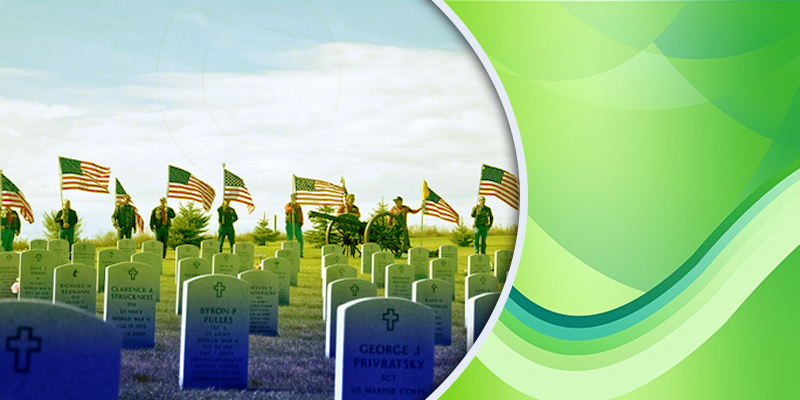
But there’s so much when it comes to veteran benefits. From burial allowances to 21-gun salutes, most military personnel and their families might not know how many alternatives they have when it comes to funeral benefits.
This article will outline all you need to know about the burial expenses that are covered by the VA, the services and items offered, the qualifications for eligibility for burial benefits, and the application process.
Understanding Veteran Funeral Benefits
The majority of veterans qualify for burial benefits through the United States Department of Defense (DOD) and the Department of Veterans Affairs (VA) (DOD).
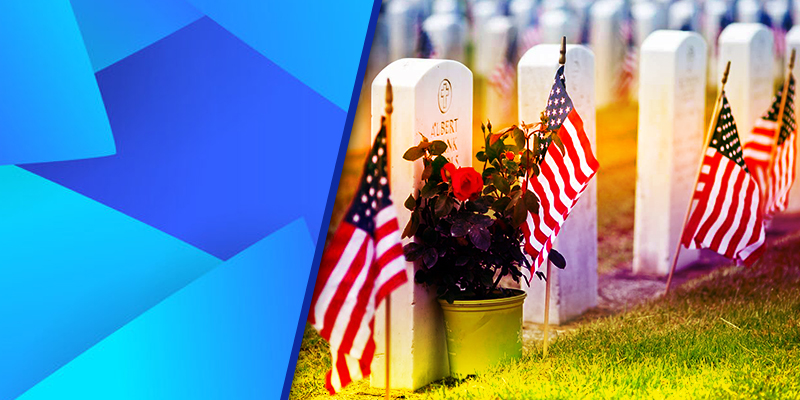
The family of the deceased will not be charged for any of the burial privileges, which may be the following:
- A gravestone in any of the VA national cemeteries.
- Opening and closing of the grave.
- Permanent care
- Headstone
- Marker.
- A medallion from the government.
- A Presidential Memorial Certificate.
- A burial flag.
Some veterans could also be eligible for burial allowances.
For spouses and dependents interred in a national cemetery, burial privileges include permanent care; a free inscription of the spouse or dependent’s name, date of birth, and death on the veteran’s grave marker, and burial alongside the veteran.
Eligible spouses and offspring could be buried with him or her even if they died before the veteran.
Eligibility for VA funeral benefits
You may be entitled to veterans’ burial allowances if you pay for the burial and funeral expenses. You won’t receive reimbursement from any other institution, such as another government agency or the veteran’s workplace.

You may qualify for VA benefits if your relationship with the veteran can be best described by one of the following:
– You are the veteran’s surviving spouse (Note: The VA recognizes same-sex marriages.).
– You are the survivor of a valid union made formal in a document issued by the state.
– You are the veteran’s surviving child.
– You are the veteran’s parent.
– You are the veteran’s estate executor or an administrator.
Which veterans are eligible?
Veterans discharged under circumstances other than dishonorable may be eligible for VA burial and memorial benefits.
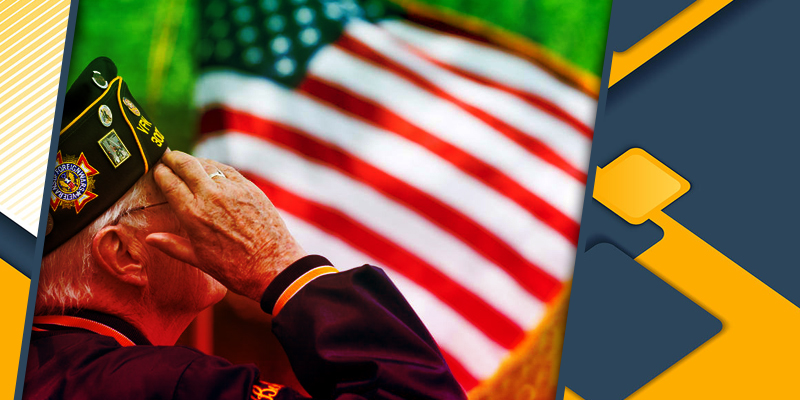
Service members who died while on active duty, inactive duty training, or active duty for training, as well as their spouses and dependent children, are also eligible. Veterans are still eligible even if they pass away before getting married or bearing children.
For a member of the National Guard or reserves, being on active duty for training is not enough to grant eligibility. However, all spouses and dependent children of reservists and members of the National Guard who received retired payments at the time of their death or would’ve been upon reaching the required age are eligible.
Eligibility breakdown
As mentioned above, a veteran’s discharge must have been anything but dishonorable for them to be eligible for benefits. Additionally, at least one of the following prerequisites must be met:
• They passed away as a result of an injury sustained during duty.
• At the time of their death, they were either receiving or entitled to obtain a VA pension or compensation.
• They died while being treated at a VA medical institution or while receiving care at a non-VA facility under a VA contract.
• They passed away as residents of a state nursing home with VA approval.
• They had an open claim that would have qualified them for VA benefits or pensions beginning before the date of their death.
• They died while en route to or from a specific location for testing, treatment, or care, with the necessary authorization and at the expense of the VA.
Who is not eligible for VA funeral benefits?
The VA won’t provide any benefits if someone passes away:
- In the line of duty.
- While representing a constituent in Congress.
- While completing a sentence in federal prison.
Additionally, according to Section 2411 of the Title 38 of the US Code, certain eligible people who are found to be guilty of state or federal capital crimes are prohibited from being buried or remembered in a national cemetery as well as from receiving headstones, burial flags, markers, or Presidential Memorial Certificates from the government.
Veterans and other VA benefit claimants can challenge VA determinations about their eligibility for memorial benefits or burials in national cemeteries.
Applying for VA death benefit
The application for VA burial benefits is made at the Burial Benefits website. Verification of eligibility for burial is done by the VA National Cemetery Scheduling Office and the regional and national cemetery directors.
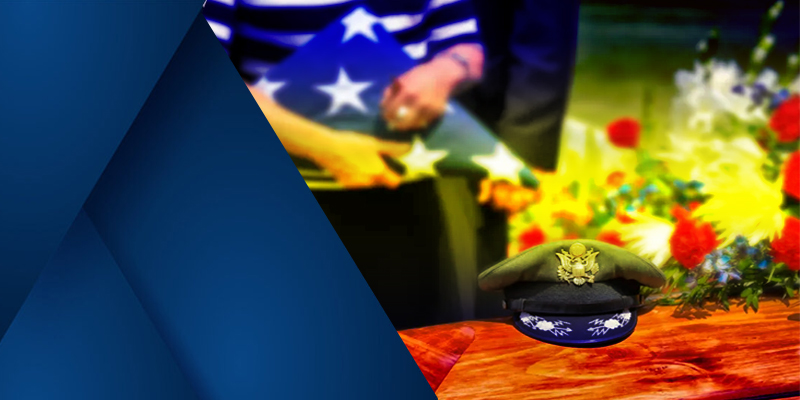
A copy of the deceased’s discharge document that details the veteran’s active duty period(s) and discharge type is typically sufficient to determine eligibility.
In some cases, a duplicate of the deceased person’s death certificate and evidence of the family member’s eligibility for benefits relating to the veteran may be needed.
Burying a veteran in a national cemetery
The Veterans Administration manages more than 100 national cemeteries nationwide and offers free burial to those who qualify. As stated above, several burial privileges are provided to the family at no cost, including a grave location in any cemetery with space.

However, it’s important to note that grave sites at Department of Veterans Affairs (VA) national cemeteries cannot be reserved in advance. Families are urged to prepare in advance by discussing cemeteries, gathering the veteran’s military records, including discharge papers, and getting in touch with the cemetery of choice.
Veteran Burial at a Private Cemetery
Veterans may receive free government headstones or markers, burial flags, and Presidential Memorial Certificates when interring them in a private cemetery.
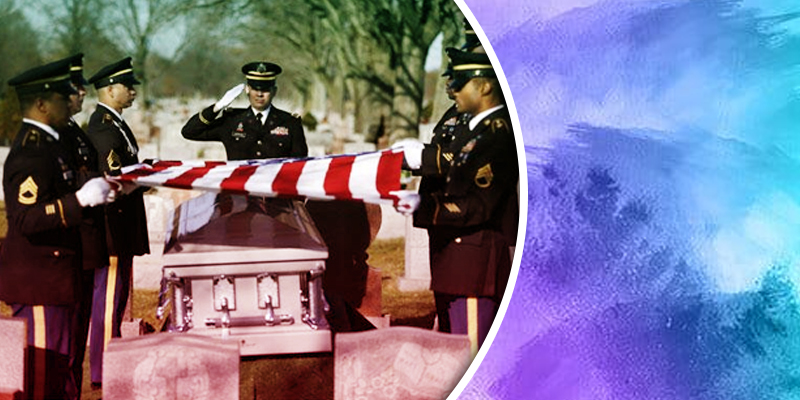
Additionally, some soldiers can be eligible for burial allowances. Spouses and children laid to rest in a private cemetery are not eligible for any benefits.
The family would need to complete VA Form 40-1330 in advance and include it with the veteran’s military discharge papers if the burial will take place in a private cemetery and a headstone or marker from the government is desired for the veteran’s grave.
VA Funeral benefits
The data below was derived from the US Department of Veterans Affairs website.
Service-Related Death Benefits
For deaths occurring on or after September 11, 2001, the VA will pay up to $2,000 in funeral costs; for deaths occurring before September 11, 2001, the VA will pay up to $1,500.
The expense of moving the deceased may be covered in full or in part if the veteran is laid to rest at a national cemetery run by the VA.
Unrelated to the service, death
- For deaths after or on October 1, 2019, the VA may pay up to $796 for funeral costs (if the VA hospitalized the deceased at the time of his or her death) or $300 for burial costs (if the VA did not hospitalize the deceased at the time of his or her death), and also a plot-interment allowance of $796 (for those private cemeteries).
- The VA will contribute up to $300 toward burial and funeral costs and a $300 plot-interment allowance for deaths occurring on or after December 1, 2001, but prior to October 1, 2011.
- The VA will contribute $300 toward burial and funeral costs for deaths that occur on or after April 1st, 1988, but before October 1, 2011, for veterans hospitalized by the Department of Veterans Affairs when they died.
A death caused by a disability or any condition for which the deceased was receiving monthly disability compensation payments is referred to as a “service-connected death.” Also, if the illness or disease was not the primary cause of death but nonetheless significantly contributed to it, it may still qualify as a service-connected death.
When a veteran receives payments for Veterans Pension Disability Compensation but passes away for some other reason unrelated to the ailments or disabilities for which they were being compensated, this is considered a non-service-connected death.
Frequently asked questions about veteran burial benefits.
What evidence is needed to prove military service?
The veteran’s discharge papers are required to prove military service. The Department of Veterans Affairs must receive this report, also known as the DD214, or a similar document (VA).
A Standard Form 180 can be sent to the Military National Personnel Record Center if this report is unavailable. After that, a copy of the Report of Separation will be mailed to the veteran, the veteran’s surviving family members, or any other individuals or organizations that have been permitted to receive it. Your funeral director will be pleased to help you acquire, complete, and submit all the necessary forms.
What do military funeral rites entail?
All veterans and active duty personnel who were not discharged dishonorably are entitled to free military funeral honors. An American flag is draped over the coffin or placed next to the urn during the service, and either a live bugler or a recording of Taps is played.
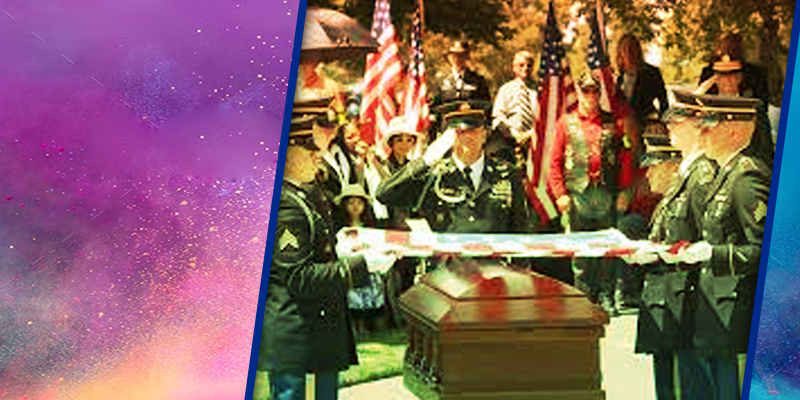
Two military soldiers in uniform offer the folded flag to the veteran’s family members after the playing of Taps. You can also ask for a rifle volley, usually known as a 21-gun salute.
What kind of compensation or allowance does the VA offer for funeral costs?
The VA provides a payment to help with some of the funeral, burial, and cremation expenses. A veteran’s family may qualify for an allowance of up to $2,000 if the veteran passes away for a reason related to their military service. The VA will provide the family with a lower payout in the event of deaths unrelated to military service. The cost of burial, burial/cremation, and funeral allowances depend on several variables, including the veteran’s age at death and whether or not he or she was receiving care at a VA hospital at the time.
Does the filing period have a deadline?
You have two years from the date of the veteran’s burial or cremation to submit a claim for burial allowances that are non-service-connected. You have two years after the discharge update to submit an allowance claim if a veteran’s discharge was updated from dishonorable to another status after death.
Who is qualified to get a gravestone or headstone?
The VA will provide a veteran’s headstone or grave marker at no charge, even if they are interred in a private cemetery. Marble, granite, or bronze are possible materials for grave markers. If you buy one, you can ask for a free bronze medallion to attach to your headstone or marker. The term “Veteran” appears at the top of these medallions, while the individual’s branch of service appears at the bottom.
